12
July 2002
![]()
2. "US believes Turkey can weather political storm, move ahead with reforms", the United States said Thursday it had confidence Turkey could weather its current political storm and move ahead with ambitious economic and political reforms.
3. "As Turkey reels, hurdles loom for EU bid, Iraq attack", two popular Turkish ministers resigned Thursday, fueling talk that the ruling coalition may collapse.
4. "Turkey's struggle for stability", almost 30 years ago Bulent Ecevit was the ambitious young Turkish politician who persuaded Ismet Inonu, the 88-year-old leader of Kemal Ataturk's Republican People's party, to step down. In so doing, he replaced the last close ally of the founder of modern Turkey, and paved the way for his own election as prime minister.
5. "The same scenario in Diyarbakir", Police attacked on the masses who participated on the commemoration ceremony for Vedat Aydin, HEP Diyarbakir Provincial Chairman who was killed by unknown perpetrators in 1991 and detained tens of people including IHD and HADEP administrators. A lot of people were wounded.
6. "The Kurdish Question in the OSCE Declaration", the Organization for Security and Cooperation in Europe (OSCE) Parliamentary Assembly adopted Berlin Declaration which denounced state terrorism and asked for, among other things, the Kurdish question to be solved.
1. - AFP - "Turkey's outgoing FM forms party of "renewal" to rival embattled PM":
ANKARA / 12 July 2002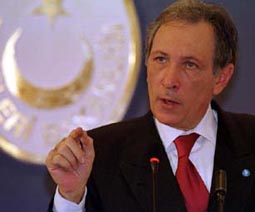
Ismail Cem, Turkey's outgoing foreign minister, announced Friday
he was forming a new social-democrat party of "renewal" aimed
at pulling the country out of political and economic turmoil and advancing
its bid to join the European Union.
Cem told a press conference that he and two other heavyweights, Economy Minister Kemal Dervis and Prime Minister Bulent Ecevit's former deputy, Husamettin Ozkan, had decided to launch the party with the support of some 40 MPs who have abandoned the embattled Ecevit. The three-way ruling coalition ran into severe turmoil in early May when the 77-year-old Ecevit fell ill and a government rift over key democracy reforms required under Turkey's struggling bid to join the EU deadlocked the government.
"One very important element of our party's program will be the achievement of Turkey's EU membership and the fulfilment of economic and political reforms required for this," Cem said. Cem, a staunch EU proponent who enjoys solid domestic and international credibility, made no secret of the new party's aim to govern the country when he said that its aims would be also "government" principles. Cem, who has restlessly worked to bring Turkey closer to the EU during his five-year term as foreign minister, and Dervis, the driving force of an IMF-backed economic recovery program, have been dubbed the "Dream Team" of Turkey's pro-EU urban elite.
The union between Cem, Dervis and Ozkan has received widespread support from a public that has grown increasingly exasperated in recent years by weak and fractured governments, which have pushed the country into political and
economic turmoil. With his resignation on Thursday, Cem dealt a possibly fatal blow to Ecevit's coalition, which is teetering on the brink of collapse after mass defections since Monday.
"The government has become a structure unable to take the steps that Turkey needs and produce compromise and solution," Cem said. "We are forming our new party in a bid to embrace whole Turkey in a renewal process that will be achieved by uniting and harmonizing all contemporary principles and bringing the contribution of social democracy," he said.
New resignation puts Turkish PM's party behind opposition
in parliament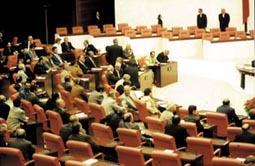
The embattled party of Prime Minister Bulent Ecevit was hit by another
resignation on Friday, which put it behind the main opposition party
in the parliament. Oguz Aygun, an MP from capital Ankara, on Friday
became the 43rd legislator to quit Ecevit's Democratic Left Party (DSP),
joining a mass rebellion against the veteran leader's insistence not
to step down.
His resignation has brought to 84 the number of seats the DSP has in the 550-seat parliament, one seat behind the centre-left True Path Party (DYP). Ecevit's shaky three-party coalition has run deep trouble with the defections which began on Monday when Deputy Prime Minister Husamettin Ozkan handed in his resignation. Several legislators, including six other ministers, followed suit.
Following the defections, the coalition's far-right partner,
the Nationalist Action Party (MHP), had become the biggest party in
parliament with 127 seats. In an interview with the NTV news channel,
the 77-year-old Ecevit admiited that he may consider stepping down if
his government lost a majority in parliament, but said he had no immediate
plans to undertake such a move. The coalition currently has a total
of 291 parliamentary seats. ![]()
2. - AFP - "US believes Turkey can weather political storm, move ahead with reforms":
WASHINGTON / 11 July 2002
The United States said Thursday it had confidence Turkey could weather
its current political storm and move ahead with ambitious economic and
political reforms.
"Turkey's economic reform program remains on track and we expect Turkey to continue to implement the program," said Lynn Cassel, a State Department spokeswoman. "The Turkish people have committed themselves to an economic and political reform agenda, including Turkey's aspirations for full EU membership.
"We strongly supports the aspirations of the Turkish people for prosperity, democracy and greater security which completion of these reforms will hasten." A second State Department official, speaking to AFP on condition of anonymity, said the mass defections from Turkish Prime Minister Bulent Ecevit's government were not a particular surprise, including the resignation of highly regarded Foreign Minister Ismail Cem.
"It wasn't really a radical development," the official said, noting that Turkey's coalition government was fractious at the best of times. "They are just rolling toward elections which seems to be what needs to happen." The official said Washington did not believe the political crisis would spill over into Turkish society, though he allowed that it had not helped the country's battered economy.
"We have confidence that the political crisis will not result in a genuine crisis for the society," the official said, adding that US diplomats in Ankara had made the same point to their Turkish colleagues. The message will be reinforced next week when two senior US officials -- Deputy Defense Secretary Paul Wolfowitz and Under Secretary of State for Political Affairs Marc Grossman, Washington's number-three diplomat -- are expected to travel there, according to government sources.
However, the sources said the trip was had been previously scheduled trip and was not particularly related to the current political upheaval. Shortly after Cem's widely anticipated resignation, Turkey's economy minister, Kemal Dervis -- an independent who was brought in last year to drag the country out of a severe economic crisis -- also quit, but later retracted his resignation.
If his resignation had been accepted, Dervis would have
become the eighth minister to leave Ecevit's government since Monday,
and would have minimized his coalition's chances of survival amid increased
prospects of elections ahead of their scheduled date in 2004. ![]()
3. - Christian Sience Monitor - "As Turkey reels, hurdles loom for EU bid, Iraq attack":
Two popular Turkish ministers resigned Thursday, fueling talk that the ruling coalition may collapse
ISTANBUL / 12 July 2002 / by Nicholas Birch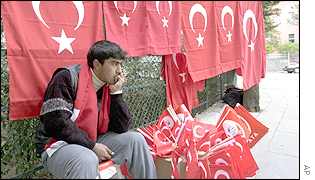
Turkey's tottering coalition of left-wingers and right-wing nationalists
moved closer to collapse Wednesday morning when popular Foreign Minister
Ismail Cem announced his resignation, followed closely by Kemal Dervis,
architect of Turkey's economic recovery program. The men are the seventh
and eight ministers to resign, further weakening a government that has
been paralyzed since May by the failing health of Prime Minister Bulent
Ecevit.
The political crisis could not come at a worse time. Growing political chaos threatens to end Turkey's fading hopes of meeting the European Union's accession criteria in time for the Copenhagen summit this December. Chances of resolving the decades-long deadlock on Cyprus are also receding fast. And the impact on a possible US attack on Iraq and the status of Turkey's peacekeeping troops in Afghanistan are both open questions.
The Turkish peacekeepers are currently confined to the Afghan capital, Kabul, but an extension of their mandate to other parts of the country is being discussed. The US has opposed any change to the status quo, but diplomats believe that with a strong lead from Turkey, the peacekeeping mission could be transformed, to the benefit of Afghan stability. The present climate of political uncertainty here, they say, makes any change unlikely.
For Cengiz Candar, columnist at moderate Islamic daily Yeni Safak, such fears are unfounded. "Turkey's mission in Afghanistan is the affair of the General Staff," he says, "and it's not their power which is falling to pieces right now."
Could affect US struggle with Iraq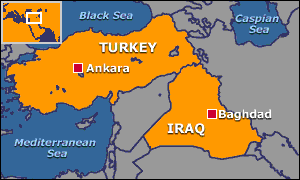
Foreign observers also fear early elections here could have a negative
effect on Turkey's foreign policy obligations, which has special resonance
for its NATO allies, including the US. Turkey recently took charge of
the peacekeeping force in Afghanistan, and is expected to play an important
role in any US-led campaign against neighboring Iraq.
According to Mr. Candar, early elections will deal a blow to Ankara's willingness and ability to provide logistical and military assistance a US assault on Saddam Hussein. Not only is it becoming increasingly unclear who in the Turkish administration US leaders should be talking to, he says, but "any country set on elections has to take into account public sentiment."
Since the plan for an attack on Mr. Hussein was first mooted last autumn, the Turkish public has been hostile. Turkey is estimated to have lost $30 billion in export revenue as a result of sanctions against Iraq since the Gulf War, and many fear a second US attack would destroy the country's crisis-stricken economy. "Any government showing enthusiasm for American plans would be perceived by the electorate as flying in the face of the country's interests," says Mr. Candar.
EU bid hangs in the balance
For most Turks, the essential issue now is Turkey's EU bid. Under
increasing pressure from Brussels in recent months to ban the death
penalty and improve cultural rights for the country's large Kurdish
minority, the government's initiatives have been blocked by ultranationalists
in the coalition. The present crisis seems to have strengthened the
hand of the anti-European faction, with Mr. Ecevit responding to resignations
in his party by promoting deputies known for their hawkish views on
Cyprus and Europe. The promotion of anti-European Sukru Sina Gurel to
the position of deputy leader, says commentator Ali Bayramoglu of Yeni
Safak, "is evidence that Ecevit is willing to adopt the hard-line
stance of his ultranationalist coalition partners."
"Turkey is at a crossroads," says CNN-Turk journalist Mehmet Ali Birand. "We could entrust our future to rising political stars capable of opening up to the EU and solving the Cyprus problem, or we could stick with the old system and the old peo- ple." The latter, he thinks, would flatten Turkey's hopes of joining Europe, at least for the foreseeable future. For pro-Europeans like Birand, Turkey's hopes of being ready to begin joining the EU in Copenhagen in December depend on the capacity of opposition leaders to form a party strong enough to challenge the present government.
"Ismail Cem's decision to resign is a vital step," says Murat Yetkin, Ankara correspondent for liberal daily Radikal. "He has prestige. Others will follow him." Reports suggest up to 40 more deputies are considering taking the leap into dissidence.
Financial markets reacted positively to the news of Cem's resignation, and commentators have said that his group stands a better chance with the resignation of Turkey's economics supremo, Kemal Dervis.
Parachuted in from the World Bank in 2000 to deal with Turkey's economic collapse, Dervis has since persuaded the IMF to hand over $17 billion in loans. Of half-German parentage, he has been sneeringly described as "an import commodity" by nationalist politicians here, and until now has resolutely maintained independence from party politics. To Birand, though, he holds the key to Turkey's immediate future.
"Any party he joins will win the next elections," he predicts. Though Dervis' resignation late yesterday came as no shock, it is not yet clear which political party he will join. He met Cem for talks on Wednesday night and is known to be friendly with other senior figures in the dissident group, but other left-wing parties have also been furiously lobbying him to join them.
Metin Heper, head of the politics department at Bilkent
University in Ankara, is convinced a phoenix is about to be born from
the ashes of Turkey's ruling coalition. "Political structures in
Turkey must change," he says. "With the arrival of Cem and
Dervis on the political scene, we will be in a totally different ball
game. And that, in my opinion, would be an excellent thing for this
country." ![]()
4. - Financial Times - "Turkey's struggle for stability":
11 July 2002 / by Quentin Peel and Leyla Boulton
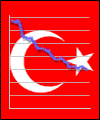
Almost 30 years ago Bulent Ecevit was the ambitious young Turkish
politician who persuaded Ismet Inonu, the 88-year-old leader of Kemal
Ataturk's Republican People's party, to step down. In so doing, he replaced
the last close ally of the founder of modern Turkey, and paved the way
for his own election as prime minister.
On Wednesday it was the turn of Mr Ecevit, now a frail and ailing 77-year-old, to fight a desperate rearguard action to cling to office himself, as some of his closest allies sought to persuade him to quit. Two of the three parties in his clumsy ruling coalition from the left and right have spoken out in favour of early elections, while his Democratic Left party (DSP) has split, with five ministers walking out.
The political turmoil in Turkey could scarcely have come at a more sensitive moment both for the country and its international allies, including the US and the European Union. Whatever government is in power, Ankara faces a whole string of difficult decisions.
For a start, the political uncertainty is in danger of undermining all the achievements of an economic reform programme backed by a $16.3bn (£10.5bn) loan from the International Monetary Fund. It also comes as Ankara is under huge political pressure from Washington to provide support for any US operation to overthrow the regime of Saddam Hussein in neighbouring Iraq. Turkish public opinion is strongly opposed to any such action, and the powerful military high command is equally sceptical.
In addition, relations with the European Union are at a sensitive stage. Turkey is seen as a vital player in attempts to broker a peace agreement between the Greek and Turkish communities in Cyprus, urgently sought by the EU as a precursor to admitting a united island to full membership. Ankara is pushing for a definite date to start its own EU accession negotiations, but has to pass several human rights reforms.
Disagreement between Turkey and Greece is currently blocking the creation of a self-sufficient European defence policy, with a rapid reaction force capable of acting outside the remit of the Nato alliance. "It is definitely worrying," according to one senior western diplomat. "The Turkish government has been dysfunctional for some time. It could easily be storing up lots of problems, including on Iraq, because we know it takes a very long time to get a consensus out of Ankara."
Turkey is now commanding the peacekeeping force in Afghanistan. But that operation may be the least of the difficulties ahead, with the Turkish military perfectly happy to operate without a clear political lead. But Iraq is far more sensitive, and no Turkish politician is likely to support US action with an election in the offing, diplomats say.
Paul Wolfowitz, the US deputy secretary for defence, and a strong advocate of military action against Baghdad, is expected to arrive in Turkey this weekend. He will try to gauge the effect of the crisis on US plans.
Sedat Ergin, Ankara bureau chief for Hurriyet, the mainstream Turkish daily newspaper, argues that the prospect of US intervention in Iraq may itself be sufficient to warrant a change of government, so that elections are held before any military action.
"If the US president decides to move on Iraq it is imperative that there should be a strong government that can deal with this issue in a businesslike manner," he says. "I doubt that the present government, with an ailing prime minister, can conduct the crisis management that this will require."
But few see Turkey as opposing a US operation after an election, even in the event of a victory by Recep Tayyip Erdogan's Islamist Justice and Development party. Indeed, associates suggest that Mr Erdogan might even be an enthusiastic backer, to legitimise his position in American eyes.
Iraq may be the most urgent question, but relations with the EU are most likely to complicate any election campaign in the coming months. Some Turks see it as a great opportunity to elect a reformist government, committed to the changes needed for EU membership, and firmly backing the IMF reform programme headed by Kemal Dervis, the popular economy minister.
Others fear that it might simply reinforce the political position of both the Islamists and the rightwing nationalists in the National Action party (MHP), a member of Mr Ecevit's coalition but opposed to the reforms demanded by the EU.
"If we could have an election that would become a referendum on the EU and could take all the necessary steps to qualify for membership, it would be a good thing for all of us," says a senior industrialist. "The danger is that we could end up with a more fragmented government with four parties rather than three. We've had cases where elections made things worse when we thought the only problem was getting rid of the government of the day."
Although two-thirds of the electorate clearly favour EU membership, a coherent pro-EU government is by no means an assured outcome because of the fragmented nature of the political system. An opinion poll by the Turkish Economic and Social Studies Foundation conducted at the end of May suggested that no party except for Mr Erdogan's Justice and Development party would cross the 10 per cent threshold for entering parliament. Another 44 per cent are undecided or determined to waste their vote. This leaves scope for new movements to emerge.
Yet financial markets and reformist politicians are still clinging to hopes of the formation of a new reformist alliance, including both Mr Kemal Dervis, architect of the IMF programme, and Mr Ismail Cem, the foreign minister. The hope is that such an alliance could take charge, either before or after an election, to steer through radical human rights reform and preserve the economic programme before the EU's Copenhagen summit in December. Turkey hopes to persuade the EU to set a date for starting accession talks there.
First, Mr Ecevit must be persuaded to step down. That
now seems to be only a matter of time. Then "everything depends
on Mr Cem and Mr Dervis", argues Sedat Ergin. "If they decide
to join forces, this could be a catalyst for important political developments.
In the end we could have a totally new political landscape." ![]()
5. - Ozgur Politika - "The same scenario in Diyarbakir":
Police attacked on the masses who participated on the commemoration ceremony for Vedat Aydin, HEP Diyarbakir Provincial Chairman who was killed by unknown perpetrators in 1991 and detained tens of people including IHD and HADEP administrators. A lot of people were wounded.
DIYARBAKIR-AMED/ 12 July 2002
Police attacked on the masses who participated on the commemoration
ceremony for Vedat Aydin, HEP Diyarbakir Provincial Chairman who was
killed by unknown perpetrators in 1991 and detained about 40 people
including IHD (Human Rights Association) Deputy Chairman Osman Baydemir.
A number of people attending to the meeting were wounded.
When the police did not give permission for the ceremony in Mardinkapi Cemetery, the masses attempted to march to the grave with the slogan "Martyrs Are Immortal" but policemen attacked them. IHD Deputy Chairman and Diyarbakir Provincial Chairman Osman Baydemir, Chairman of Food Workers Union Arif Akkaya, HADEP Diyarbakir Provincial Deputy Chairman Mefair Altindag were detained along with about 40 other people. IHD Law Commission, stated after meeting with the detainees that the justification o f the detention was violation of the Law on Meetings and Demonstrations.
Serif Seven seriously wounded
Serif Seven who was beaten brutally was in Diyarbakir State Hospital. He was reported under life threat. Other injured people Selami Demirhan, Sehnaz Turan, Gani Alkan, Umut Tekin, Veysi Akbas, Nazim Caglak, Nuran Ekti, Mehmet Yesilbag, Mehmet Deviren and Medeni Kaya were also treated in the hospital.
Attack denounced
The attack was denounced by Aydin family and HADEP Diyarbakir administratros. Ali Urkut, HADEP Diyarbakir Provincial Chairman, made a press conference together with Aydin's brother Veysi Aydin and his wife Sukran Aydin in HADEP premises. The conference was attended by 500 people. Ali Urkut said the following: "We denounce the approach which does not respect laws and insists on having its own way. Why do not those who have not tolerate commemorations of tens of people killed try to find the perpetrators? The reason of the plight of the country is this repressive, anti-democratic approach. Such an approach which bans names and the language of a people makes Vedat Aydin a monument in the hearts of the people."
And brother Veysi Aydin also denounced the attack, saying, "Democratic demands cannot be repressed violently." Sukran Aydin, for her part said the following: "I myself surrendered my husband to them in 1991. I have lived with fear for years. I knew that we could not reach the cemetery today. If millions come together, we will win. Even if we do not see, our children see it. I greet those who confront the attack head on."
Vedat Aydin, Chairman of closed HEP (People's Democracy Party) Provincial Chairman, was taken under custody by plain-clothed people with wires on July 5, 1991. His tortured body was found in a deserted place between Ergani and Maden on July 8, 1991.
"Killings should be enlightened immediately"
IHD Deputy Chairman and Diyarbakir Provincial Chairman
Osman Baydemir, in a written statement, said with words to the effect:
"We commemorate Vedat Aydin and those who lost their lives in his
funeral as a result of a brutal attack with respect. Vedat Aydin was
a human rights activists, a defender of democracy and peace. We call
attention that after 11 years those who have violated the right to live
have not been prosecuted, and law and public conscience remains violated.
There are 1441 killings whose perpetrators are unknown and summary executions.
And overwhelming majority of the cases remain unsolved." ![]()
6. - Kurdish Observer - "The Kurdish Question in the OSCE Declaration":
The Organization for Security and Cooperation in Europe (OSCE) Parliamentary Assembly adopted Berlin Declaration which denounced state terrorism and asked for, among other things, the Kurdish question to be solved.
12 July 2002 / by CEMAL UCAR
The 11th Annual Parliamentary Assembly of OSCE (Organization for security and Cooperation in Europe) was concluded. More than 300 parliamentarians from 55 participating states attended to the sessions. OSCE Parliamentary Assembly unanimously adopted the Berlin Declaration focussing on the political, economic and the human rights aspects of the central theme of the Session: "Confronting Terrorism: a Global Challenge in the 21st Century". The Article 91 of the declaration which is the first one in OSCE history including a resolution in relation to Kurds is as follows: "It encourages the participating countries to take part in the international efforts to eliminate the injustice in the Middle East, to recognize all rights of Palestinians and Kurds minorities wholly and to contribute to the right of all countries in the region to co-exist peacefully and securely."
State terrorism denounced
After meetings in Berlin from 6 to 10 July 2002 focussing on the political, economic and the human rights aspects of the central theme of the Session: "Confronting Terrorism: a Global Challenge in the 21st Century", OSCE PA denounced all sorts of terrorism and for the first time added state terrorism to the list. The relevant part of the article 79 of the Declaration is as follows: "OSCE PA denounces all sort of state terrorism which is used for military, strategic and political measures." The article gives a message especially to Israel and Turkey. During the discussions of the report by Svend Robinson, Rapporteur of the General Committee on Democracy, Human Rights and Human Problems the states in question have also been mentioned.
Conflicts should be eliminated peacefully
Declaration reminds all OSCE participating States that any measures which may restrict human rights and fundamental freedoms in response to terrorism have to fully respect international law including the Geneva Convention and relevant OSCE commitments and must be viewed as exceptional, temporary and non-arbitrary. The Berlin Declaration also proposes that the International Criminal Court (ICC) should be recognized by all the participating countries and extend its scope as to comprise the terrorist crimes. The Declaration reminds national parliaments their roles to observe human rights more strictly as well.
Origins of terrorism and its elimination
The documents lists the origins, aims of terrorism and the problems it causes. The Assembly stresses the need for the international community to look into the profound causes often underlying terrorist acts, these being the political, economic and social inequalities prevailing in the world.
The Declaration, emphasizing that justice, respect to human rights and high-level political participation are the most effective means in struggle against the terrorism as well as struggle against poverty, reminds the participating countries that the gap between poor and rich countries should be eliminated. The Declaration asks for the struggle against terrorism to comply with "international agreements" and existing conflicts to be eliminated "peacefully and justly".
Contacts of Hadep and KNK
The General Assembly sessions were attended by KNK (Kurdistan
National Congress) and HADEP (People's Democracy Party) closely. Meeting
with a number of delegations including those from Austria, Germany,
England, USA and Scandinavian countries, Chairman of KNK Foreign Affairs
Commission Musa Kaval and HADEP's Europe representative Faik Yagizay
communicated their views on Turkey and the Kurdish question. German
Parliament Buntestag President Wolfgang Thierse was reported to say
that Germany knew the sufferings of ![]()